
A lottery is a type of gambling in which many people buy chances (tickets) and the winning tickets are drawn from a pool. These games are usually organized by the state and involve a variety of methods, including instant-win scratch-off games, daily games and games where you pick three or four numbers.
A lotteries have long been a part of history, both in the United States and around the world. They have been used to raise money for public works projects and private ventures, such as building roads, colleges, canals, and even churches. They were also used to finance the American Revolution and other wars.
The word “lottery” dates from the 15th century, when various towns in the Low Countries held public lotteries to raise money for town fortifications and to help the poor. A record dated 9 May 1445 in the town of L’Ecluse describes a lottery that raised 4,304 tickets and 1737 florins (worth about US$170,000 in 2014).
Although the origins of lotteries date back centuries, they became popular in Europe in the 17th century. They were particularly successful in raising funds for municipal repairs and aiding the poor.
They were later adapted to award cash prizes. In this form, they became very popular in the Netherlands. They were also used to fund a wide range of other public uses, such as sports and entertainment.
In the United States, most states and the District of Columbia have lotteries, with several different types of games offered. Most of these games are instant-win scratch-offs, but some have a more traditional “lottery” feel with a drawing process.
There are many ways to play the lottery, from buying a ticket at a local convenience store to using a computer system and a computer-generated number pool. The most common type of lottery involves picking six numbers from a set of balls, with each ball numbered from 1 to 50. Other types of lotteries can include multi-state games where all participating states contribute to a single prize pool.
If you want to play the lottery, you should understand your rights and responsibilities. You should read your state’s laws and regulations carefully, and be sure to check the minimum age requirements for playing.
The most important factor in playing the lottery is to choose a game that offers good odds. The odds of winning a large jackpot vary widely from game to game, but they are generally very small.
You should also look for a game that has high prize payouts and a large pool of numbers. This will help you maximize your chance of winning the jackpot, and it will also increase your odds of winning a smaller prize.
Some of the larger lotteries require physical presence, so it is important to choose a game that allows you to participate in person. In addition, choose a game that is based on a number pool with a high percentage of winners, such as Powerball or Mega Millions.